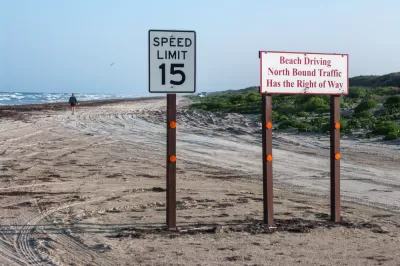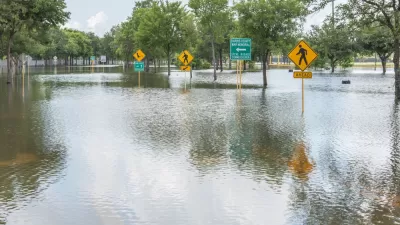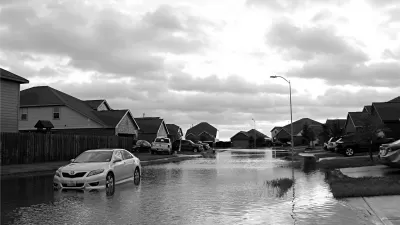In a new book, lawyer Jim Blackburn suggests that engaging private landowners is the only way to manage the coast of his home state.

Hurricane Harvey brought up a number of questions for residents of the Gulf Coast of Texas. Was the damage so severe because of zoning, or sprawl, or climate change? Is it better to rebuild or buy out? Is a storm just as severe inevitable?
And more than anything, how do we keep this from happening again?
Environmental lawyer Jim Blackburn presents one strategy in his new book, A Texan Plan for the Texas Coast, calling “not for greater regulation but for new markets.”
There are several unique attributes of the Gulf Coast of Texas that make a private-sector approach to management the strongest, according to the author, who leads a research group at Rice University called the Severe Storm Prevention, Education, and Evacuation from Disasters Center (SSPEED).
“The Texas Gulf coast is one of the least regulated of U.S. coastal areas. Blackburn attests that without federal environmental law (Clean Air Act and Clean Water Act) and the Army Corps of Engineers, for which he taught in the 1980s, there would be no environmental law on the Texas coast. Since 1972, when Texas rejected the federal regulations and funding of the Coastal Zone Management Act (CZMA), the state has more or less managed its own coast.”
A related attribute is that 80 percent of the land along the Texas Gulf Coast is privately owned. Private property rights in Texas are sacred, so that’s unlikely to change.
“In a market economics based approach, private landholders would sell carbon sequestration credits to corporations in the form of (unregulated) commodity contracts. The consumer would then, ostensibly, purchase such products branded as carbon-neutral.”
Not everyone believes that a voluntary system would be effective, but “Blackburn is optimistic. In his view, eco-services of ranching, birding, and fishing would continue to be maintained through private litigation, entrepreneurship, competition, and personal commitment."
FULL STORY: BOOK ON THE TEXAS GULF COAST OFFERS ‘TEXAN PLAN’

Planetizen Federal Action Tracker
A weekly monitor of how Trump’s orders and actions are impacting planners and planning in America.

Maui's Vacation Rental Debate Turns Ugly
Verbal attacks, misinformation campaigns and fistfights plague a high-stakes debate to convert thousands of vacation rentals into long-term housing.

Restaurant Patios Were a Pandemic Win — Why Were They so Hard to Keep?
Social distancing requirements and changes in travel patterns prompted cities to pilot new uses for street and sidewalk space. Then it got complicated.

In California Battle of Housing vs. Environment, Housing Just Won
A new state law significantly limits the power of CEQA, an environmental review law that served as a powerful tool for blocking new development.

Boulder Eliminates Parking Minimums Citywide
Officials estimate the cost of building a single underground parking space at up to $100,000.

Orange County, Florida Adopts Largest US “Sprawl Repair” Code
The ‘Orange Code’ seeks to rectify decades of sprawl-inducing, car-oriented development.
Urban Design for Planners 1: Software Tools
This six-course series explores essential urban design concepts using open source software and equips planners with the tools they need to participate fully in the urban design process.
Planning for Universal Design
Learn the tools for implementing Universal Design in planning regulations.
Heyer Gruel & Associates PA
JM Goldson LLC
Custer County Colorado
City of Camden Redevelopment Agency
City of Astoria
Transportation Research & Education Center (TREC) at Portland State University
Jefferson Parish Government
Camden Redevelopment Agency
City of Claremont





























